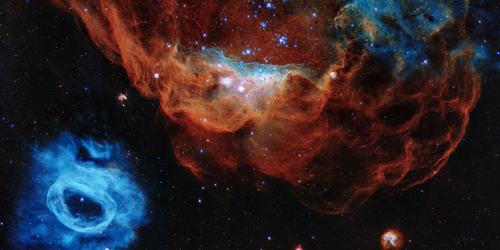Neutrinos Might Rescue Hubble
Neutrinos are major players in the evolution of the Universe, but they often play second fiddle to splashier constituents, such as dark matter and dark energy. A new analysis, which involves adding a hypothetical interaction between neutrinos, shows that these particles could resolve an ongoing puzzle over the Hubble constant, a number that characterizes the cosmic expansion rate. The proposed neutrino self-interaction might also explain other discrepancies in cosmology and particle physics.
Large numbers of neutrinos were forged in the big bang, but their light mass made them unfit for creating the gravitational seeds of galaxies and other structures. In fact, neutrinos inhibited some of this early structure formation by escaping, or “free streaming,” from dense regions in the Universe. The impact of free-streaming neutrinos has been characterized by measuring the fluctuations in the cosmic microwave background (CMB)—one of the best tools for probing cosmic history.
However, the CMB-based estimate of the Hubble constant is smaller than estimates based on local galaxy motion. To address this so-called Hubble tension, Christina Kreisch from Princeton University and her colleagues propose a new interaction between neutrinos that postpones the onset of neutrino free streaming. The team shows that delayed free streaming forces a rescaling of CMB data that aligns the Hubble constant estimates. Self-interacting neutrinos might also resolve another discrepancy in galaxy clustering observations.
Particle physicists currently have no direct evidence of neutrino self-interactions, but certain neutrino experiments have reported observations that disagree with current models. Kreisch and colleagues believe that their neutrino model might open a new line of attack for dealing with these neutrino anomalies.
This research is published in Physical Review D.
–Michael Schirber
Michael Schirber is a Corresponding Editor for Physics based in Lyon, France.




